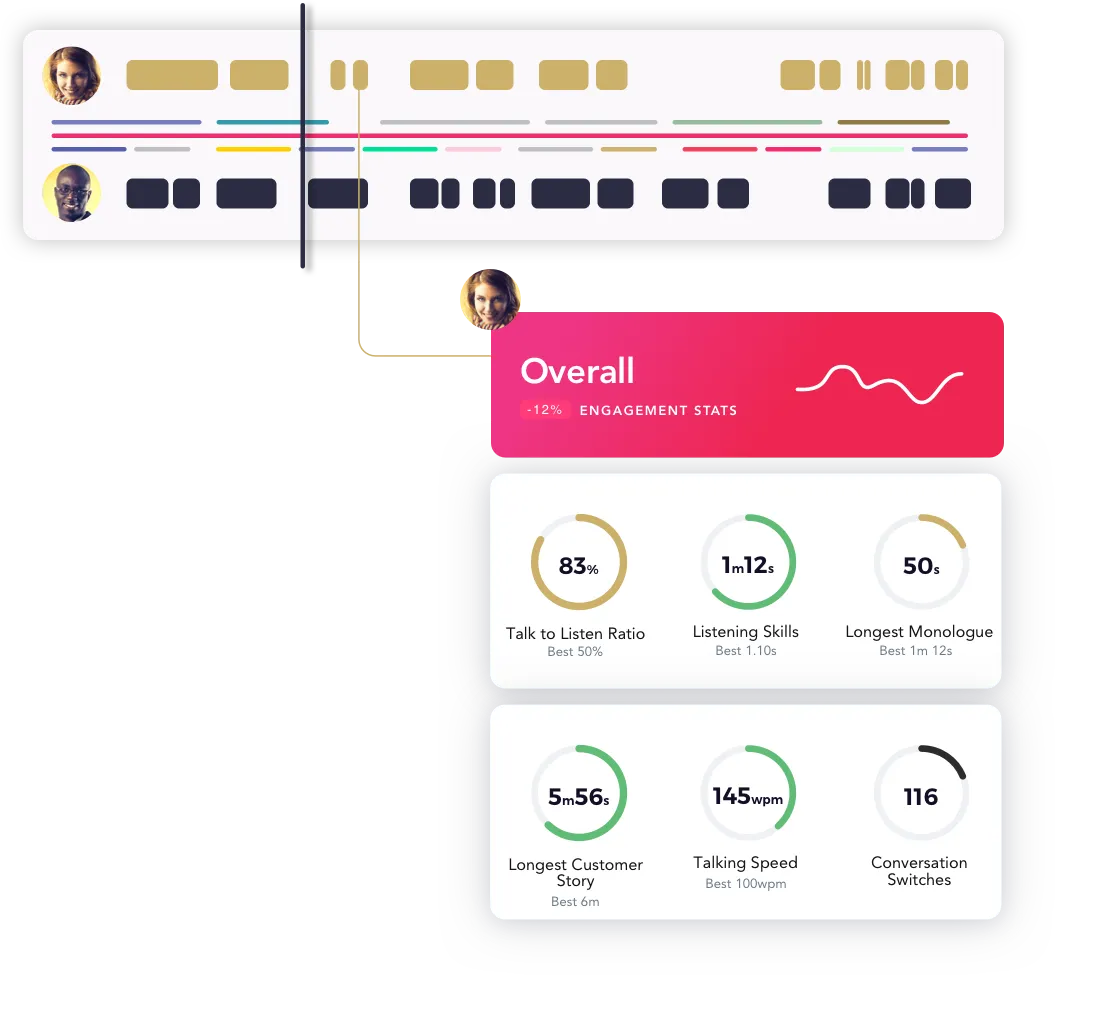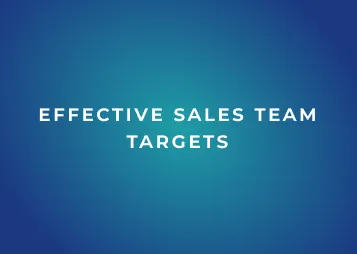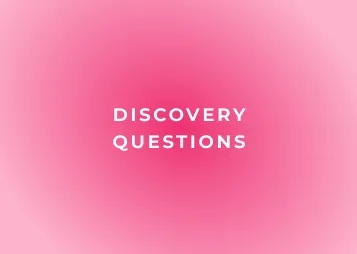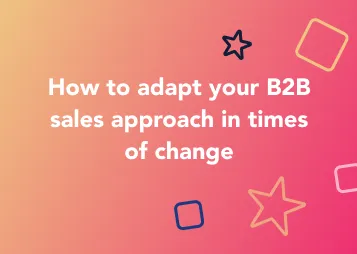60-Second Summary
Sales call recording captures every customer conversation and, with conversation intelligence, auto-transcribes, time-stamps, and analyzes them for coaching and revenue impact. Sales Leaders and Account Executives use recordings to improve objection handling, build enablement playbooks, accelerate onboarding, and share best-practice calls. Integrations push notes, actions, and transcripts into CRM for clean documentation and forecast visibility. Follow best practices: secure consent, pick a tool with strong privacy/GDPR controls, encrypt storage, and manage access. Use insights like talk/listen ratio, question rate, topic and sentiment trends, and automated call scoring to spot risks, track methodology adoption, and prioritize coaching. Beyond Sales, Marketing mines voice of customer for messaging, Product gets direct feedback, and CS/Support improve handoffs. Practical cadence: review recordings weekly, annotate key moments, and convert learnings into scripts and training. Net effect: less admin, faster ramp, higher win rates, and a scalable, data-driven coaching culture powered by AI.
---
By definition, call recordings create logs of all interactions between a client or prospect and a business. This can be achieved regardless of the call or video call provider you are using, either using built-in call recording or adding a call recorder app.
Often transcribed automatically by conversation intelligence platforms, organizations now use recordings to benefit the whole organization.
So...why record sales calls?
Using call recording tools may sound like micromanagement, but in most cases, it’s the complete opposite. In fact, businesses that add call recording into their workflow aim to:
- Encourage reflection and continuous improvement.
- Help sales representatives develop skills and better prepare for customer calls.
- Empower reps to self-coach and peer-to-peer coach.
- Reduce administrative tasks like creating meeting notes and actions.
- Make it easier for team leaders to find and listen to key moments to coach reps on.
- Make collaboration across departments easier, and more effective.
It’s worth noting how common call recording is nowadays. There is so much to be gained from it and due to its automated nature, you achieve many benefits without any extra work from your side. Its increasing popularity also means customers very rarely have issues with calls being recorded.
Let’s take a closer look.
The technology behind sales call recording
Many call recording tools provide auto-transcription, which frees reps to focus on the conversation as it happens, instead of having their focus pulled by note-taking. You never need to ask a prospect or customer to repeat what they just said or worry that you missed a key detail.
Call recordings capture everything in the video and transcript, so you can revisit them. It's great to hear both what was said and how it was said, which can be the difference between winning and losing a deal.
A Conversation intelligence (CI) platform also allows you to time-stamp notes and mark key moments of the conversation during a call. That way, you know exactly when a specific point was made.

Call recording takes care of repetitive administrative tasks like logging the activity. In fact, tools like Jiminny Sidekick automatically find and update the CRM record for the contact you’re meeting with. Your CRM stays effortlessly and automatically up-to-date without losing momentum or worrying about manually logging everything at the end of the day.
Call recording facilitates communication across the business. The practice makes it easier to brief others when preparing for customer handovers or sharing client feedback with other teams.
All you need to do is share the recording with the appropriate individuals. This enables them to hear what the customer said and exactly how they said it — no paraphrasing necessary.
Sales call recording and CRM documentation
Sales call recording tools that integrate with CRMs make for very reliable and thorough CRM documentation, as meeting transcriptions and follow-up actions are automatically sent to the CRM records after each meeting.
Having this record means sales managers have visibility (not to mention peace of mind) into team activity and can track sales opportunities within the CRM.
What are the benefits of call recording?
It’s not all about sales…
Documenting the voice of customer through call recordings make for benefits across the business.
Gain insight into market trends
Marketing teams can use call recordings to gain insight into market perceptions about trends, competitors and their position in the marketplace. They can also pick out great customer stories to use as case studies.
Get direct product feedback
Product teams receive more accurate and direct feedback on the products they create, their use cases and future development requests.
Understand your customers better
Customer Success and Support teams better understand customer needs, whether they are using the product as intended and how competitors are positioning and performing in their CS teams.
Operations teams can learn more about customers' process and functional requirements, how their needs are changing, and how this might impact them as a supplier. This allows for process planning and strategic decision-making, to name just a few.
Improve your onboarding process
HR teams can utilize call recordings in their onboarding process, to get new hires quickly up to speed on the company's work and lay out benchmarks for best practices. The visibility they gain in collaboration with the Operations team also makes for better resource and recruitment planning.
Finetune your sales coaching
Coaching your sales reps helps them hone their sales skills and keep everyone aligned with your organization’s goals. But sales coaching is always best when it’s grounded in real-life examples, not guesswork. Recording sales calls let you see exactly how reps handle tough questions, objections, or closing conversations. This means that instead of vague customer feedback, you can use recorded sales calls to highlight what’s working, what’s not, and make actionable improvements that actually work.
Boost sales enablement
Call recordings can strengthen sales enablement by giving you and your team direct and valuable insight into what’s going on during real conversations. For example, you can identify the objections your reps typically face, the points that win deals, and the top questions customers ask. This makes it easy to create relevant playbooks, refine your training and make sure your entire team has the tools and strategies to close more deals.
Capture real-time, genuine customer testimonials
When you record and analyze calls, it’s easier for your team to capture those moments when customers share exactly what they love about your product or service. This gold mine of information can then be turned into testimonials that feel authentic and relatable. No need for follow-ups for forced scripts — you’re just pulling straight from the customer interactions that already show your value.
Reduce costs and save time
For the organization as a whole, recording your sales calls streamline sales workflows, cutting down time spent in follow-ups, clarifying details, or repeating training. Plus, they give everyone a clear record to reference, so there’s less back-and-forth and fewer misunderstandings. Not to mention, you’ll get more time back in your day to focus on what matters most – leading your team to bigger wins.

Sales call recording best practices
While recording your sales calls can serve as a powerful tool for improving business performance and driving results, it’s important to approach it thoughtfully. Here are some best practices to keep in mind:
Always ask for consent
Before recording your sales calls, always be sure to ask your customers and prospects for their permission. This is not only the right thing to do, but it also builds trust, avoids legal issues, and creates a better experience for all parties involved.
Choose the right tool
Select a recording solution that fits into your workflow and is intuitive for your team. Tools like Jiminny’s conversation intelligence platform are perfect for sales call recording thanks to AI-powered features like automatic transcription, conversation data, and seamless integration with other systems.
Integrate with your CRM
Connecting your call recording platform with your CRM gives you a centralized hub for all sales activity. This means that you can keep your data organized, streamline your follow-ups, and track progress. Jiminny was designed to make your life easier. Check out our integrations!
Establish clear guidelines
Set clear expectations with your teams on how recordings will be used. This might include outlining how these recordings will support training, feedback, and other goals, so everyone is on the same page about their purpose.
Analyze valuable call transcripts
Leverage transcripts to highlight important moments from calls, like when a deal might have gone sideways or a great closing line. Searchable, detailed transcripts save you time and make it easier to uncover valuable insights, identify trends, and refine your sales strategy.
Make the most of your call insights
Why record your sales calls if it isn’t to learn from them? Turn what you gather from your recordings into actionable changes, like improving scripts, refining your message, and addressing challenges that consistently come up during conversations.
Track use cases
One of the greatest call recording benefits is that they can give you useful use cases that you can later apply in different situations. So, document how your team is using call recordings and maximize their value during your next onboarding, coaching session, or training activity.
Comply with data policies
To avoid any issues, always follow applicable data privacy and storage regulations. Securely store recordings and, whenever possible, remove personally identifiable information to keep sensitive customer data protected.
Regularly review calls
Make it a habit to revisit recordings every once in a while to keep improving. This can be during weekly team reviews or individual check-ins, just make sure you stay consistent and use this information to help your team grow.
Use sales call recordings for good
No one likes to feel micromanaged, so at first, some reps might resist call recordings. As a manager, avoid this by approaching call reviews with positivity and a focus on building confidence. Highlight what your team is doing well and how they can build on their strength. Your goal here should be to create a supportive environment where everyone feels empowered to improve.
How to use call recordings for coaching
This is the big one! Your call recordings could be the key to increasing your conversion rate and turning your team into a high-performance powerhouse.
Most employees want help developing skills to advance their careers. Call recording makes this possible by facilitating more and better coaching opportunities so employees can improve incrementally every single day.
Sales conversation recordings make it easy to understand how and where a rep is performing well, to double-down on areas of skill, and to identify areas that need improvement.
Leaders and managers have more time to coach because CI makes it fast and easy to find the best coaching moments. Sales coaching sessions can then focus on key areas, relevant to each rep, making everyone’s time more effective. Reps can also self-coach by listening back to calls, identifying and tracking the patterns and finding their own areas of learning.
It’s also easier to gather input from peers on specific calls or call snippets. Asking for feedback and advice within the team makes for better team cohesion and knowledge sharing. The best-performing reps can share textbook calls with the team, so people know what good looks like.

How to use call recordings for sales enablement
Sales call recordings can give your team exactly what they need to succeed by turning real conversations into practical tools. For example, they make it easier to create playbooks and training materials grounded in real success stories, so, instead of guessing, you can pull examples of how top reps handle objections, answer difficult questions, and close deals.
They’re also a huge help for onboarding new sales reps, giving them a chance to listen in on real calls and learn how your best people communicate with potential customers. This can give them the confidence to jump in and start contributing right away.
For leaders, recorded calls are a great way to spot patterns and fine-tune strategies. This can help bring the team together and learn from each other. Together, these cannot only enable better sales conversations and drive deals but also build a more empowered, successful team.
Call recording - GDPR, security and permissions
Can you sense the elephant in the room?
Don’t worry, we’re not going to ignore security concerns. So let's address it head on: is recording sales call legal?
First up, if you are recording calls, you need to make this known to everyone on the call with you. But it doesn’t have to be a big deal. Transparency is key, not just for compliance with regulations like GDPR but also for maintaining trust with prospects and clients. The good news is that this doesn’t have to feel awkward or disruptive.
We’re all used to hearing ‘this call is recorded for monitoring and training purposes’ by now. Chances are, your prospects won’t think anything of it either. But if they do, you can simply turn the recording off for that call.
It’s also important to have a system in place for securely storing and managing your team's sales call recordings. Look for tools that encrypt data and allow you to control access so sensitive information always stays protected. When done correctly, sales call recording can be a secure and natural part of your sales process, but it’s always important to keep transparency, respect for privacy, and security measures in the back of your mind.
Now let’s talk sensitive data.
What happens to sensitive or private data in sales call recordings?
You have a few options here, and the best call recording tool providers are well-placed to ease any concerns, talk it through and put in place the necessary steps for you. Here are a few things to consider:
- Some tools allow call recording to be paused while sensitive or private information is shared and then unpaused afterward, so the call can continue seamlessly.
- Some tools allow you to limit access to call recordings to certain individuals or groups within an organization, so you can keep sensitive information with only the people who need it.
- Ask about a platform's security processes and accreditations before signing your agreement. Your provider should be highly knowledgeable about this and more than willing to share.
Automated sales call recording and analysis - the game-changer
Each call recording platform comes with its own features. But those with a focus on CI allow you to automate functions that save time and improve operations For example:
- Set up a notification every time a customer mentions a given word, so you know straight away when a certain competitor or product feature comes up in conversations. This can be really handy to keep an eye on industry trends and competitors or to understand your most common sales objections.
- Create sales methodologies that calls are scored against, so you can see how well your reps are performing in all their calls at a glance. This aids rep onboarding and development.
- See which topics and themes are discussed the most in each department’s call recordings to understand internal and external discussions at the top level before diving into more detail.
Unlock your sales with Jiminny
Sales call recording can unlock new ways for your team to work and grow. At Jiminny, we make call recording analysis easy. We built a conversation intelligence platform designed to turn those recordings into insights so you can make smarter decisions and boost your team’s sales performance.
With features like automated call scoring and AI-driven analysis, you can see exactly what’s working, what’s not, and how to better coach your team to close more deals. Plus, our platform connects your call data to your CRM, making it easy to track progress and measure success.
Want to see it in action? Book your free demo today and discover how we can help your sales team grow!
You might also like...
How to launch sales call recording with your team
Tom Lavery is the CEO and Co-Founder of Jiminny, the leading conversation intelligence and sales coaching platform that helps companies maximize their revenue. With over 15 years of experience in high-growth VC/PE-backed SaaS companies, Tom was previously SVP at Reward Gateway, now sharing his wealth of knowledge as a speaker in the conversation intelligence space.





.webp)






